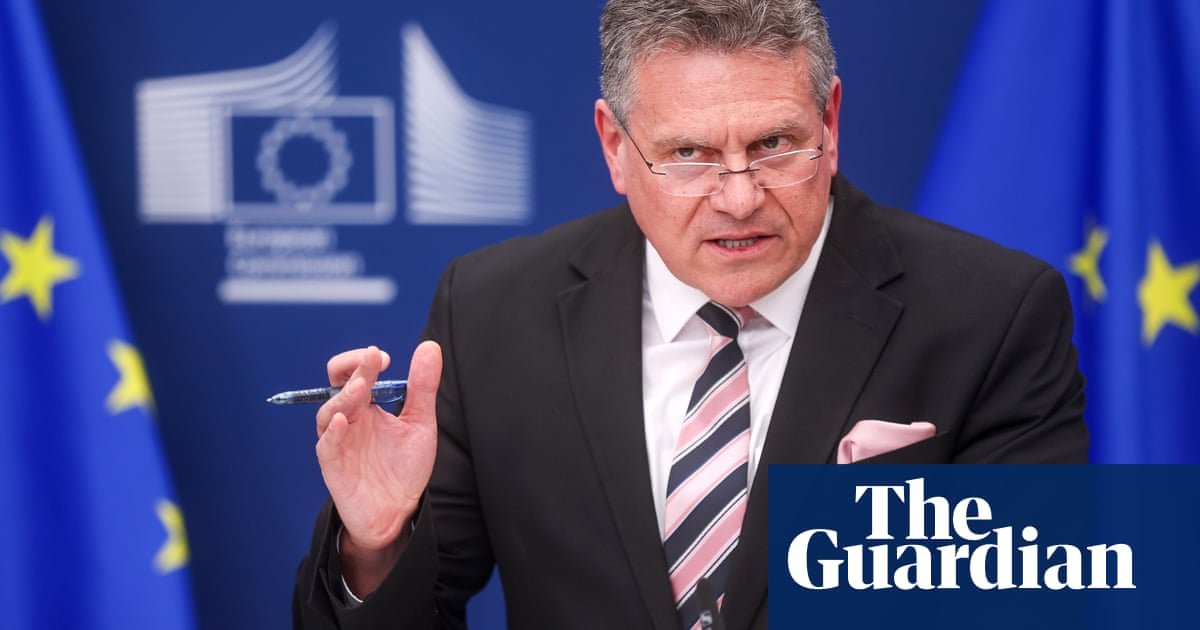The EU and US are closing in on a high-level “framework” trade deal that would avert 50% tariffs on all exports from the bloc next Wednesday, Donald Trump’s self-imposed deadline.
Talks in Washington could go down to the wire, but diplomats and officials said the EU was willing to accept Trump’s 10% blanket tariffs. Negotiators will only accept this, however, in exchange for an extension in talks and possible concessions on a 25% car tariff, which is hurting the German car industry, sources said.
The US treasury secretary, Scott Bessent, hinted a deal was possible after meeting the EU’s trade chief, Maroš Šefčovič, on Thursday morning in Washington.
“We’ll see what we can do with the EU,” he told reporters at a wider briefing on treasury matters, declaring on the eve of 4 July celebrations that the US was “going to see a lot more trade deals”.
The US commerce secretary, Howard Lutnick, and the US trade representative, Jamieson Greer, are scheduled to continue talks with Šefčovič on Thursday afternoon. EU ambassadors are expected to be briefed on the talks on Friday.
Bessent said Greer would be “working diligently over the weekend” with European officials.
Trump has threatened to impose 50% tariffs on all EU goods from 9 July unless the two sides reach a deal. Most EU goods already face a 10% tariff, with levies of 25% on cars and car parts and 50% on steel and aluminium.
The push for a narrowly focused UK-style agreement in principle comes days after the German chancellor, Friedrich Merz, reiterated his calls for a quick deal. “It is better to achieve a quick and simple solution than a lengthy and complicated one that remains in the negotiation stage for months,” he said in Berlin.
Merz said a quick deal was needed “to remove the burden of tariffs on our businesses, which are far too high”, and that the current talks were “not about a minutely detailed trade deal” but “the quick resolution of a tariff dispute”.
Šefčovič was seeking a standstill clause to provide “guarantees that the US can stand over” that there would be no imposition of new tariffs in any extension period, said one politician with knowledge of the talks.
One EU diplomat said they expected a deal “if not this week then before Wednesday”, because it was “in everybody’s interest”.
“It will be very high level, but enough for Trump to declare victory,” said one source. Some believe a deal could even be struck this week, giving the US president a significant announcement on 4 July Independence Day celebrations on Friday.
Talks between the EU and the US have been taking place since early April when Trump imposed tariffs on 60-plus countries in a theatrical “liberation day” presentation. He has concluded a formal deal with only one of those countries, the UK, although he claims to have struck agreements with Vietnam and China.
One source said the EU delegation that flew to Washington for talks in April was handed a “massive tome” on US “grievances, country by country”. “There were about 30 pages on the EU alone,” they said.
after newsletter promotion
Sources in Berlin said Merz took some time to persuade the European Commission president, Ursula von der Leyen, to switch tack and pursue a UK-style approach.
Von der Leyen said on Thursday: “Indeed, what we are aiming at is an agreement in principle, because [with] such a volume, in 90 days, an agreement in detail, it’s impossible … That is also what the UK did. And as far as I’m informed, there are only two countries so far worldwide that have concluded with an agreement in principle.”
Others said Trump’s frustration lay with the approach of a European institution used to dealing with 27 member states and the minute detail of regulation.
They also indicated that the US’s latest proposal – sent to EU leaders last Wednesday – “did not include any details on … concessions from the US side”.
In a briefing to EU ambassadors this week, von der Leyen’s chief of staff, Bjoern Seibert, and the director general of the commission’s trade department, Sabine Weyand, told member states the US wanted deals on four areas including tariffs.
The other three issues were strategically important sectors such as pharmaceuticals and semiconductors, economic purchases such as oil and gas, and non-trade barriers including tech, food and car regulation, all red lines for the EU.
